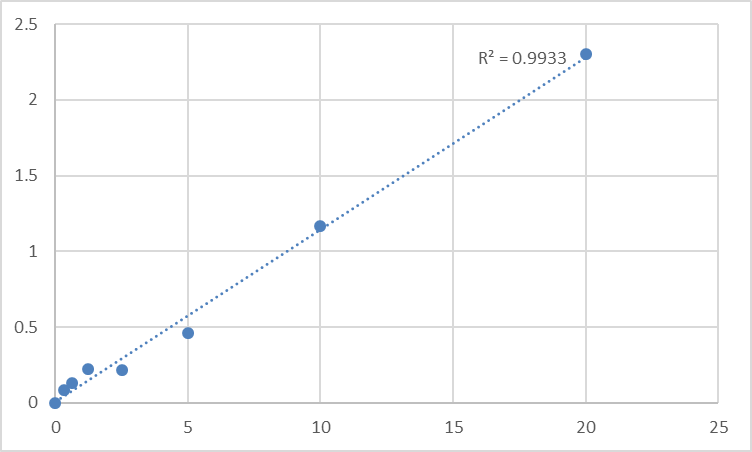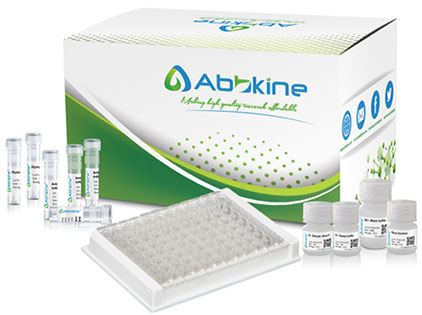| Product name | Human Monocarboxylate transporter 3 (SLC16A8) ELISA Kit |
| Reactivity | Human |
| Applications | ELISA |
| Applications notes | This Human Monocarboxylate transporter 3 (SLC16A8) ELISA Kit employs a two-site sandwich ELISA to quantitate SLC16A8 in samples. An antibody specific for SLC16A8 has been pre-coated onto a microplate. Standards and samples are pipetted into the wells and anySLC16A8 present is bound by the immobilized antibody. After removing any unbound substances, a biotin-conjugated antibody specific for SLC16A8 is added to the wells. After washing, Streptavidin conjugated Horseradish Peroxidase (HRP) is added to the wells. Following a wash to remove any unbound avidin-enzyme reagent, a substrate solution is added to the wells and color develops in proportion to the amount of SLC16A8 bound in the initial step. The color development is stopped and the intensity of the color is measured. |
| Detection method | Colorimetric |
| SampleType | Cell culture supernatants, Other biological fluids, Plasma, Serum |
| Assay type | Sandwich ELISA (quantitative) |
| Assay duration | Multiple steps standard sandwich ELISA assay with a working time of 3-5 hours. It depends on the experience of the operation person. |
| Alternative | SLC16A8; RP5-1039K5.14; MCT3; REMP; monocarboxylate transporter 3; solute carrier 16 (monocarboxylic acid transporters); member 8; solute carrier family 16; member 8 |
| Kit components | • Human Monocarboxylate transporter 3 microplate • Human Monocarboxylate transporter 3 standard • Human Monocarboxylate transporter 3 detect antibody • Streptavidin-HRP • Standard diluent • Assay buffer • HRP substrate • Stop solution • Wash buffer • Plate covers |
| Features & Benefits | Human Monocarboxylate transporter 3 (SLC16A8) ELISA Kit has high sensitivity and excellent specificity for detection of Human SLC16A8. No significant cross-reactivity or interference between Human SLC16A8 and analogues was observed. |
| Calibration range | Please inquire |
| Limit of detection | Please inquire |
| Usage notes | • Do not mix components from different kit lots or use reagents beyond the kit expiration date. • Allow all reagents to warm to room temperature for at least 30 minutes before opening. • Pre-rinse the pipet tip with reagent, use fresh pipet tips for each sample, standard and reagent to avoid contamination. • Unused wells must be kept desiccated at 4 °C in the sealed bag provided. • Mix Thoroughly is very important for the result. It is recommended using low frequency oscillator or slight hand shaking every 10 minutes. • It is recommended that all samples and standards be assayed in duplicate or triplicate. |
| Storage instructions | The unopened kit should be stored at 2 - 8°C. After opening, please store refer to protocols. |
| Shipping | Gel pack with blue ice. |
| Precautions | The product listed herein is for research use only and is not intended for use in human or clinical diagnosis. Suggested applications of our products are not recommendations to use our products in violation of any patent or as a license. We cannot be responsible for patent infringements or other violations that may occur with the use of this product. |
| Background | SLC16A8 is a member of a family of proton-coupled monocarboxylate transporters that mediate lactate transport across cell membranes . The deduced 504-amino acid protein has a calculated molecular mass of 52.3 kD. MCT3 has 12 putative transmembrane domains and a long cytoplasmic loop between transmembrane domains 6 and 7. MCT3 shares 85% and 62% identity with rat and chicken Mct3, respectively, and highest similarity is in the transmembrane region. PCR analysis detected MCT3 in RPE RNA, but not in neural retina RNA, suggesting that in human, as in chicken and rat, the expression of MCT3 is restricted to RPE. |
| Gene ID | 23539 |
| Alternative | SLC16A8; RP5-1039K5.14; MCT3; REMP; monocarboxylate transporter 3; solute carrier 16 (monocarboxylic acid transporters); member 8; solute carrier family 16; member 8 |
| Accession | O95907 |

Fig.1. Human Monocarboxylate transporter 3 (SLC16A8) Standard Curve.

Fig.2. Abbkine ELISA kit is series of sandwich ELISA to quantitate specific protein in samples.
You must be logged in to post a review.
Reviews
There are no reviews yet.